Sudesh Amman: From troubled schoolboy to terrorist
- Published
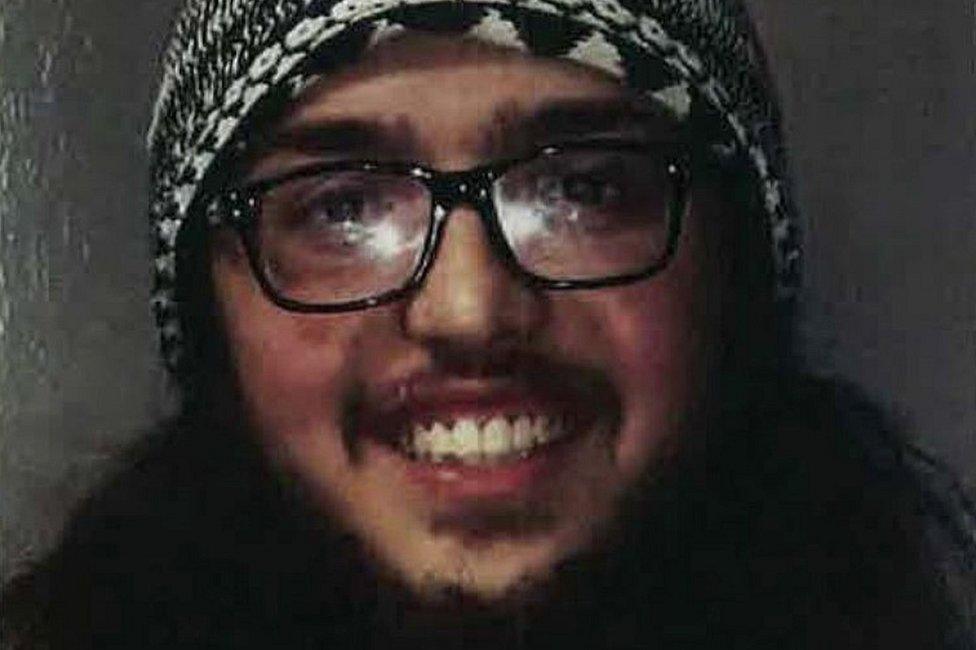
Sudesh Amman was shot dead by surveillance officers on Streatham High Road in February 2020
An inquest jury has concluded that Sudesh Amman was lawfully killed. The 20-year-old was shot by surveillance officers moments after he had stabbed two people in Streatham, south London.
What led him to carry out such an attack less than a fortnight after he was released from prison, and were opportunities missed to stop him?
Ever since secondary school there had been serious concerns about Amman's violent behaviour.
At that time he was living with his mother and five brothers in north-west London in what social workers described as a "chaotic" and "extremely unclean" house. His father had returned to Sri Lanka and was largely absent.
The paper trail of concerns about Amman, in which he is often called Sudesh Faraz, goes all the way back to then.
In April 2016 it was alleged he had attacked a fellow pupil with a "gun, axe and sword".
In February 2017 he tried to slash a classmate with broken glass and then punched him in the head.
During a mental health assessment he claimed that aged 14 or 15 he had witnessed "the decapitation of human bodies" on a trip to Sri Lanka.
In May 2018, when he was 19, he was arrested on suspicion of preparing a terrorist act after a Dutch blogger alerted police to posts Amman was making in a Telegram chat group. He had said he was "armed and ready".
A search of Amman's phone showed he had encouraged his girlfriend to join him and urged her to kill her "unbelieving" parents if necessary.
In the end he was charged with, and pleaded guilty to, possessing documents useful to terrorists and disseminating them.
The judge expressed particular concern about Amman's attempt to radicalise his 11-year-old brother, and a comment made to his 15-year-old brother that he wanted to blow himself up.
The conviction resulted in a 40-month custodial sentence but under the rules at the time Amman had to be released half-way through.
CCTV shows Sudesh Amman's final moments
Amman spent his entire jail term in Belmarsh prison in south-east London.
Throughout his time there he showed no sign of becoming less radical. If anything he became more so and was emboldened by his status as a Terrorism Act (TACT) prisoner.
He mixed with other high-profile terrorist prisoners including Hashem Abedi, the brother of the Manchester bomber, Ahmed Hassan, the failed Parsons Green bomber, and Abdulla Ahmed Ali, external, the leader of the Al Qaeda plot to blow up multiple transatlantic airliners with explosives hidden in liquids in bottles.
'Lee Rigby deserved it'
The Mercury Intelligence System, used by prisons to record information on inmates, had entries referring to Amman radicalising others inside Belmarsh, even in the months between his arrest and his conviction in November 2018.
There were also allegations he was planning to attack a prison officer.
One entry recorded he had "openly shared extreme views which include a desire to kill the Queen, become a suicide bomber and join ISIS".
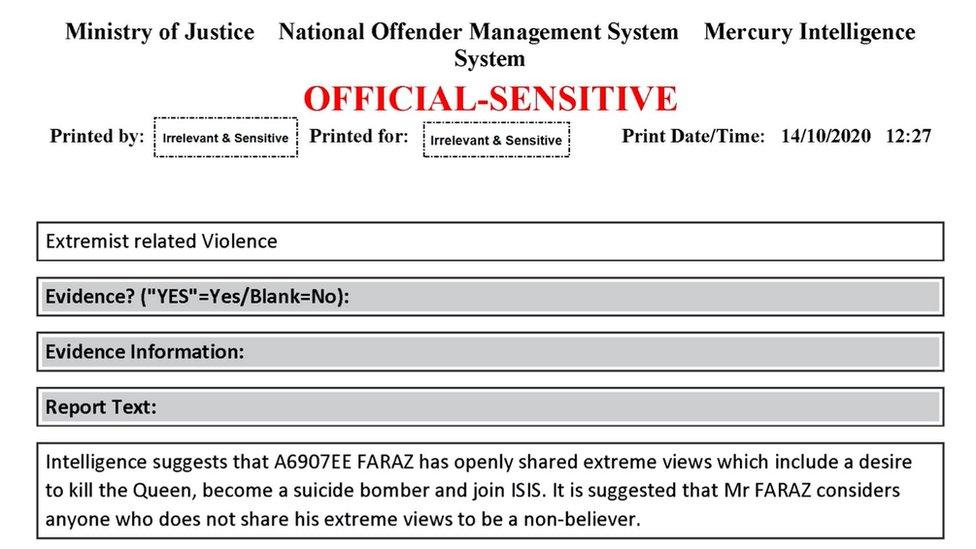
Records were kept of Amman's behaviour in prison
Another entry was recorded after he spoke about Fusilier Lee Rigby, who was murdered outside Woolwich barracks in May 2013. Amman said: "Lee Rigby was a soldier and killed innocent people so he deserved it, eye for an eye."
He was moved to the high-security unit but that just made it easier for him to associate with other convicted terrorists.
A recurring theme among the concerns was Amman's friendship with Mohiussunnath Chowdhury, who was first accused, but subsequently cleared, of planning a terrorist attack outside Buckingham Palace. He was later jailed for life for planning another attack.
In December 2019, even as preparations were being made for Amman's inevitable release from prison, a search of his cell uncovered a handwritten pledge of allegiance to Abu Bakr Al-Baghdadi, the leader of the Islamic State group.
However, it was not clear if the note was in Amman's handwriting. Graffiti in his cell resembled the flag used by the Islamic State group.
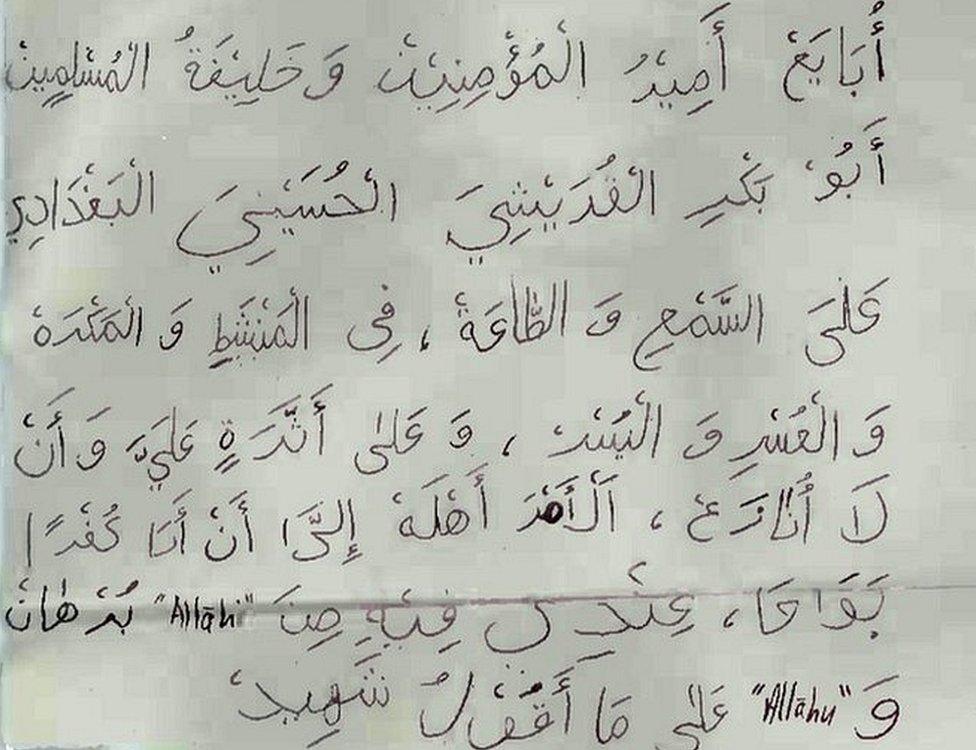
A pledge of allegiance to Abu Bakr Al-Baghdadi was found in Amman's cell
Entries in the intelligence records suggest Amman had "bulked up" and was going to the gym "for the sake of Allah".
In a phone call with his mother, he said: "I am a terrorist, I am in prison for terrorism.
"I was a bad person. I'm not going to lie to you, I still am a bad person, but Allah will forgive me. You know I'm a bad person."
One report stated that in a conversation with another inmate, Amman said: "These non-believers man, I'm not finished with these non-believers yet."
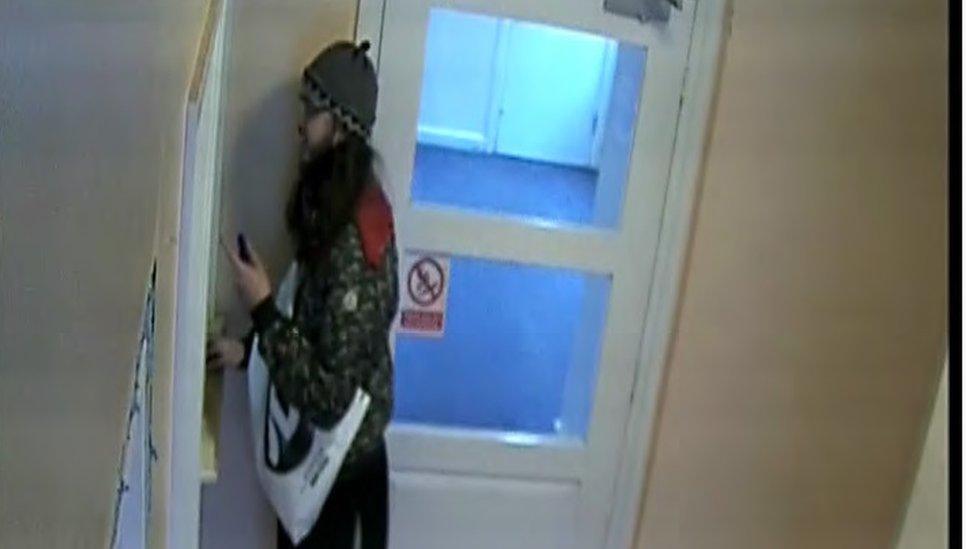
Amman was given strict licence conditions upon his release from jail
As his release date was coming closer, counter-terrorism detectives were watching with alarm.
On 3 January 2020, Amman jumped on some internal netting situated between landings within the jail, causing disruption. Officers hoped it might lead to his prison sentence being extended.
In an intelligence update circulated by officers in Counter Terrorism Command they wrote that "it is the collective view of the SIO (senior investigating officer), investigation team and all partner agencies that he represents one of the most dangerous individuals that we have investigated".
On 15 January 2020, Det Ch Supt Alexis Boon wrote to the then-governor of HMP Belmarsh, Rob Davis.
The letter detailed some of Amman's behaviour in prison and ends: "I would respectfully ask you to consider if, based on the incident on 3 January 2020, there are any additional measures that could be imposed that could delay the release of Mr Amman in order to assist mitigate the significant risk he poses to the public upon release."
But eight days later, under the rules in place at the time, Amman was released from prison.
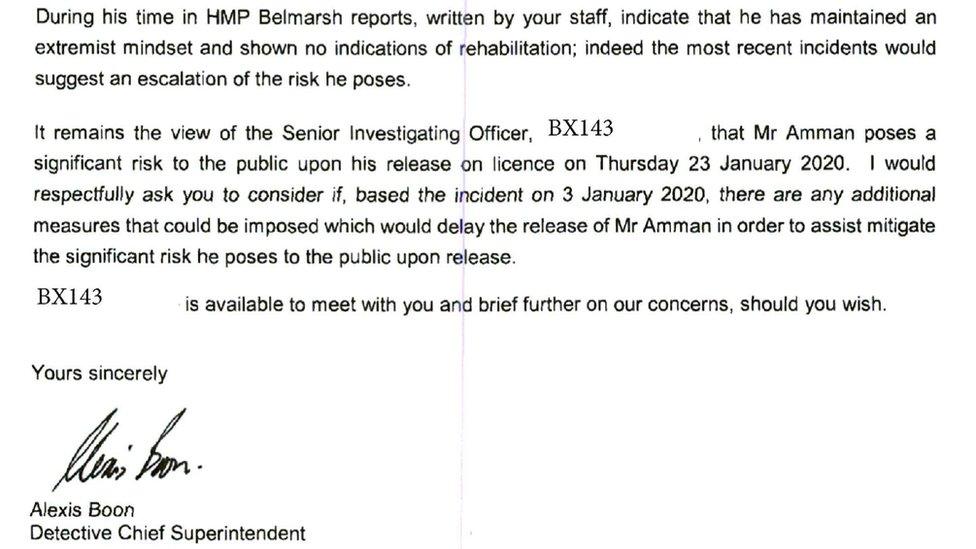
Police wrote to the prison's governor asking if Amman could be kept in jail for longer
Such was the alarm about the risk he posed to the public, Amman had some of the most strict licence conditions that can be imposed.
He had to wear a satellite-linked ankle tag which could track his movements.
His curfew meant that he had to be in his probation hostel, or approved premises, between 21:00 and 06:00, and also between 10:00 and 11:00, and between 16:00 and 18:00.
He was banned from travelling to large parts of central London.
The Metropolitan Police's Counter-Terrorism Command SO15, working with MO3 Covert Policing, put in place a plan to follow him wherever he went.
After a few days it was decided the surveillance officers should be armed to protect themselves and the public.
On Friday 31 January, a week after his release, the surveillance team saw Amman in Poundland buying aluminium foil, parcel tape and Irn Bru in plastic bottles. That was all he purchased.
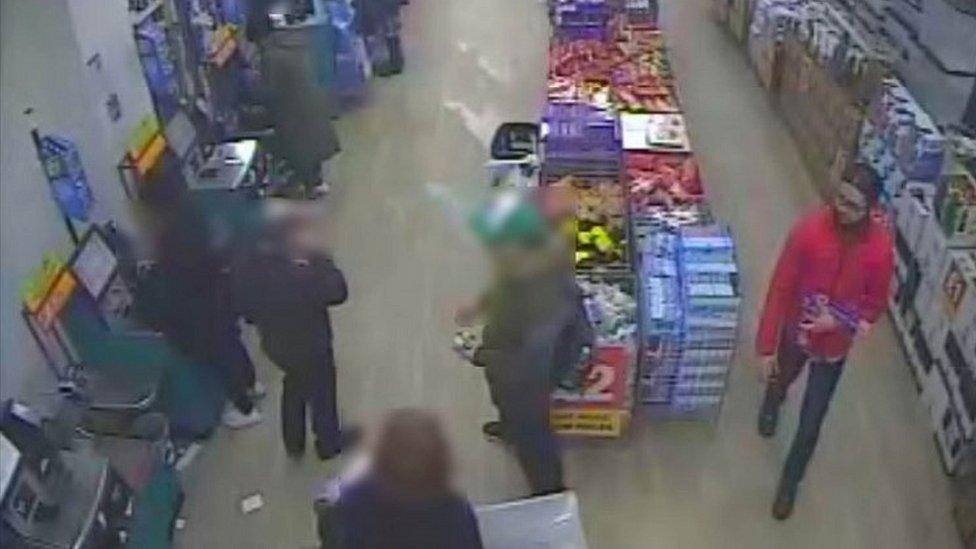
Amman was captured on CCTV buying aluminium foil, parcel tape and and bottles of Irn Bru
SO15 and the security service MI5 held an emergency Joint Operations Team (JOT) meeting that evening because everyone was aware the Poundland items could be used to make a hoax suicide belt.
There was a discussion as to whether Amman could be arrested. But it was decided that there would not be enough evidence to charge him and he would just be released, now fully alerted to the fact that he was being followed.
Instead, the JOT decided to increase the armed surveillance on Amman to 24 hours a day, including his curfew hours.
Rajiv Menon QC, who represented Amman's family at the inquest, argued this was the big missed opportunity to thwart his plans. He said the police operation had been a "miserable failure" that resulted in two people being stabbed.
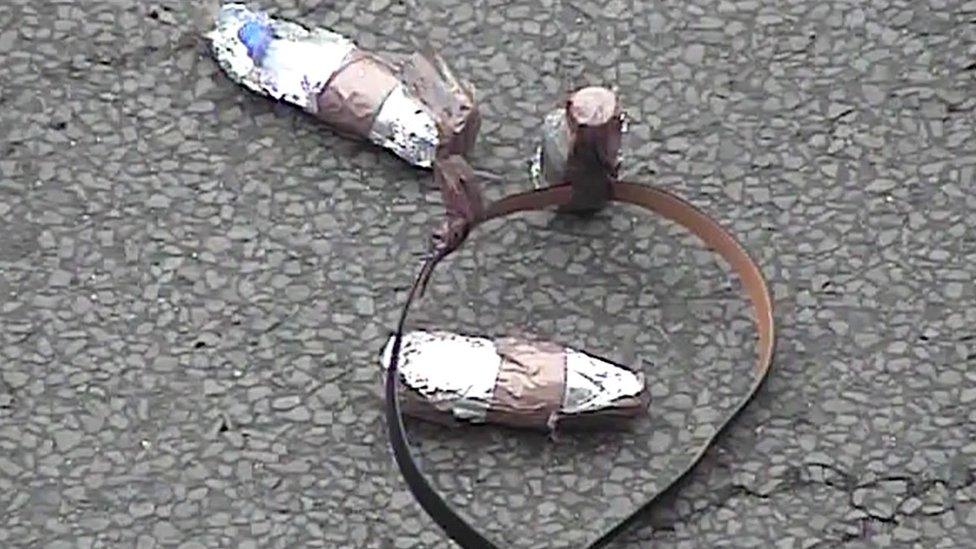
Amman used his purchases to create a fake suicide bomb belt
Surveillance officers remember the briefing they received the morning after Amman's shopping trip was particularly "sombre", although as it turned out Saturday 1 February was quiet, with Amman just popping out to buy some chicken at lunchtime.
The following day he left the approved premises at 13:22 GMT, wearing a bulky camouflage coat and an empty JD Sports bag slung strangely across his stomach. No-one seems to have considered this might be hiding something like a fake suicide vest.
A nine-man surveillance team - some on foot, some in cars, and one on a motorbike - followed him to Streatham High Road in south London. On the way, he spoke to his mother on the phone. He ended by saying: "Bye bye, I love you Mummy."
On Streatham High Road the officers watched as Amman went into a households good shop called Low Price Store where he had previously looked in the knife section.
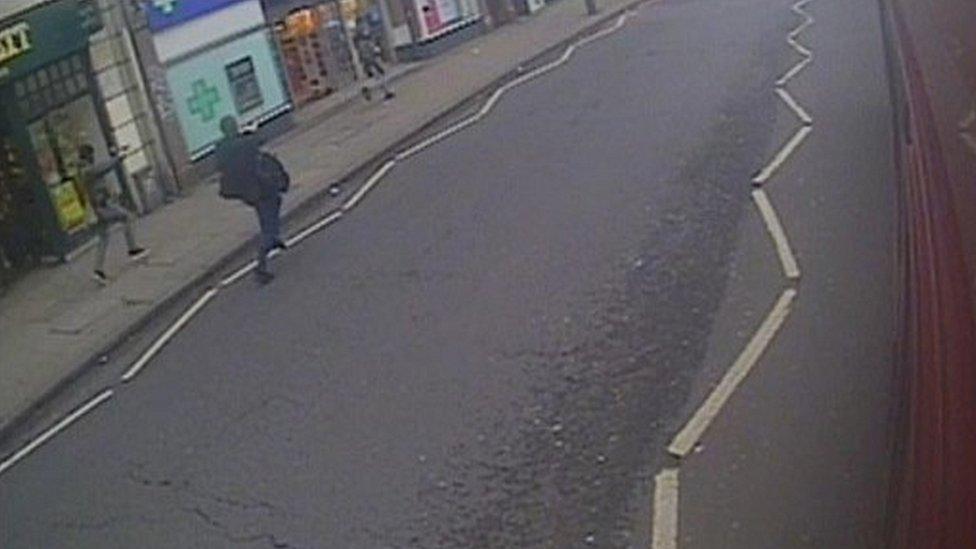
Amman stabbed two people before he was killed outside a Boots chemist
Before a surveillance officer could get into the shop to see what he was doing, he ran out with a large kitchen knife in his hand and ran through the Sunday afternoon shoppers, stabbing a woman and a man. Both survived.
The attack ended 62 seconds from the point Amman left the shop. Outside Boots he turned on two surveillance officers who were running after him shouting: "Stop! Armed police!"
The knife flashed in his hand as he stepped towards them.
It was at that point that both officers opened fire and Amman's troubled life came to an end.
Related topics
- Published13 August 2021
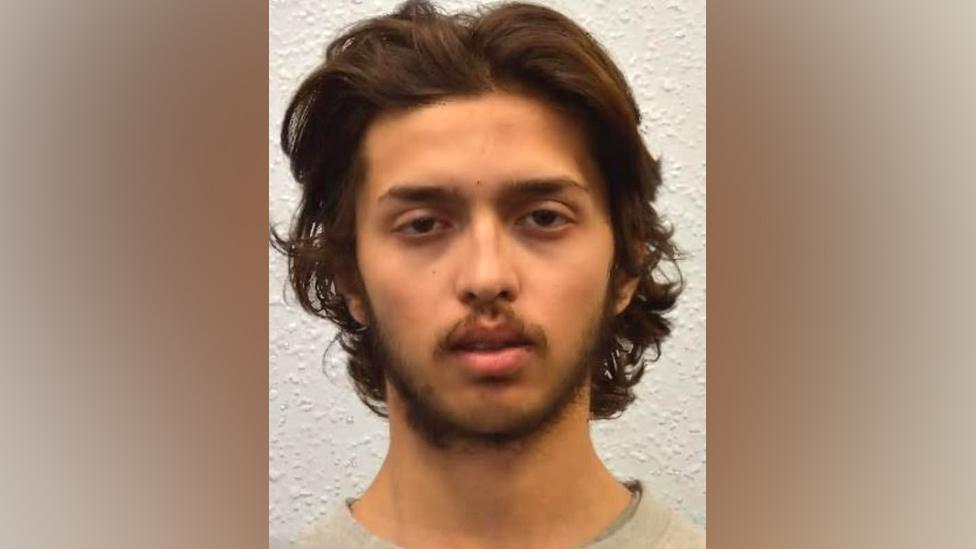
- Published11 August 2021

- Published3 August 2021

- Published2 August 2021
